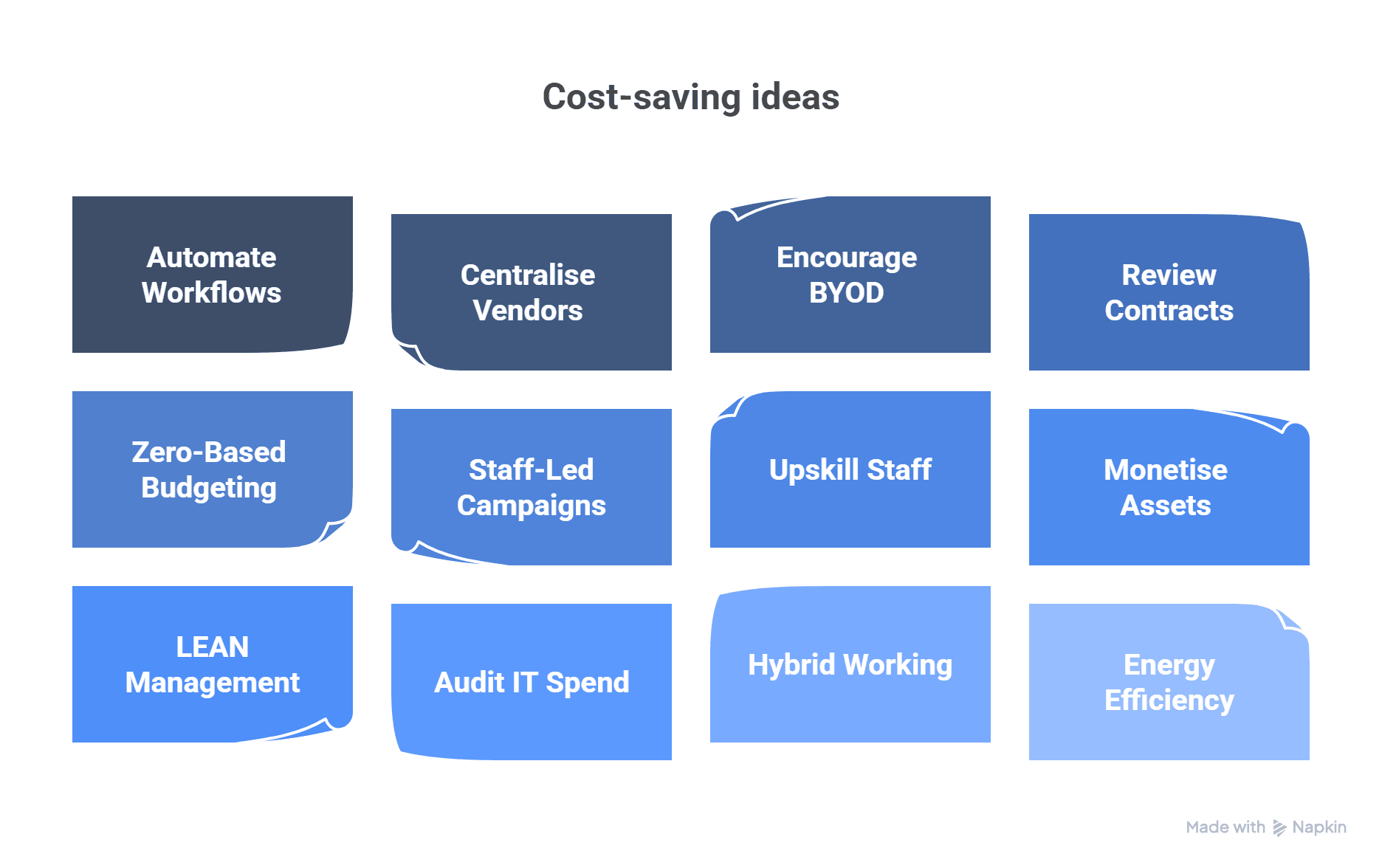12 Proven Cost-Saving Ideas for Large UK Companies (Backed by Smart Strategies)

Key takeaways
- Adopting cost-saving strategies empowers large UK businesses to manage inflation, post-Brexit costs, and rising energy bills while protecting profit margins and operational resilience.
- Workflow automation platforms like Cflow reduce manual errors, accelerate approvals, and improve compliance, making them essential for cutting overhead across HR, finance, and procurement.
- Tech audits, hybrid work models, and vendor consolidation can uncover hidden savings and help UK enterprises reinvest in innovation, talent, or expansion opportunities.
- A strategic approach to cost-saving—combined with LEAN methods, green incentives, and employee-led initiatives—ensures long-term financial sustainability and business agility.
Building a profitable business is the core of every business strategy. The methods adopted to achieve business profits vary in every business. Building a profitable business may be achieved by increasing sales or adopting cost-cutting measures. Increasing sales has many variables like market conditions, consumer requirements, business infrastructure, etc.
Building a Profitable Business in the UK: Why Cost Saving Matters More Than Ever
In the UK’s dynamic business landscape, driving profitability goes beyond growing sales — it’s about doing more with what you already have. While revenue generation often depends on shifting market conditions, customer sentiment, and Brexit-driven supply dynamics, cost optimisation remains a lever fully in your control.
For large UK-based enterprises, especially those facing rising inflation, energy bills, and post-pandemic recovery costs, small operational efficiencies can translate into substantial gains. As per the Office for National Statistics, input price inflation and labour shortages are among the top business pressures across the UK in 2024.
From leveraging process automation to smarter energy management, this guide explores 12 proven cost-saving strategies that have helped large UK companies cut waste, improve cash flow, and boost operational resilience.
Understanding Business Costs in a UK Context
Before making cuts, it’s crucial to understand where the money goes. Here’s how costs are typically structured in UK businesses:
Direct Costs: Materials, labour, logistics — think of things like sourcing parts from EU suppliers or domestic courier contracts.
Indirect Costs: Overhead expenses like council tax, electricity, business rates, or insurance.
Fixed Costs: Rent on premises in London, Manchester, or Birmingham remains constant regardless of revenue.
Variable Costs: Utilities, packaging, outsourced services – these change with business volume.
Sunk Costs: Already spent funds, such as R&D on discontinued product lines.
Controllable Costs: Expenses like temporary staffing or marketing, which can be adjusted by departmental leads.
UK businesses also face unique cost factors: high corporate electricity tariffs, sector-specific levies, and post-Brexit customs charges. Mapping these out allows you to trim with precision, not blunt-force cuts.
Discover why teams choose Cflow
Transforming Costs to Profits
Before we go to cost-saving ideas for large businesses, we must understand the different types of costs. Direct, indirect, fixed, variable, operating, controllable, opportunity, and sunk costs are the main types of costs incurred by businesses.
Direct costs include the cost of raw materials, labour, distribution, and expenses. They are directly related to a service or product. These costs can be traced to a product or project, or a department. Indirect or hidden costs are not related to a product or service, and cannot be traced to a project or department.
As the name suggests, fixed costs do not vary with the number of goods or services provided by the company. Variable costs vary with the production volume of the company. Day-to-day business activities contribute to the operating costs of a business. Sunk costs have already been incurred in the past and cannot be avoided. These costs are not included in future business decisions. Controllable costs are those that can be controlled by the manager.
Here are a few ways to transform your costs into profits:
1. Reduce Overhead:
Streamlining business processes to eliminate overhead costs is an effective cost-saving method. Renegotiating terms with vendors and adopting more efficient operation methods are ways to cut overhead costs.
2. Generating unexpected revenue:
Cost centres can invent new revenue sources by utilising excess inventory or building space in a novel way to generate income.
3. Support for business strategy:
Active participation in the company’s strategy will help the company sell more products and services. Working on ways to improve product/service quality, speed or price, bringing innovation in work execution, or tuning product/service offerings to consumer demands will result in more revenue.
End-to-end workflow automation
Build fully-customizable, no code process workflows in a jiffy.
12 Cost-Saving Ideas That Work for UK Enterprises

1. Automate Workflow Processes Across Departments
Manual processes cost UK businesses thousands in lost time and compliance risks. Automation platforms like Cflow can streamline finance approvals, procurement cycles, HR onboarding, and IT service requests – all without writing code.
In the UK, where GDPR compliance is strict, automated workflows also reduce the risk of human error in sensitive tasks.
2. Centralise and Optimise Vendor Relationships
British firms often work with multiple local and EU-based vendors. Maintaining a preferred supplier list allows for better negotiation, reduced administrative burden, and greater visibility into spending. Build loyalty and lock in better terms with regional vendors by guaranteeing volume or exclusive relationships.
3. Encourage a BYOD Scheme (Bring Your Own Device)
Rather than providing laptops and mobile phones for every staff member, UK companies can implement secure BYOD policies. With cyber essentials in place, you can safely subsidise personal devices, cutting hardware and replacement costs. This is particularly useful in hybrid setups.
4. Review Contracts Annually – Especially Utilities and Software
With energy prices fluctuating sharply in the UK, businesses should annually review energy, waste, broadband, and software licenses. Use comparison tools like uSwitch or seek independent procurement specialists to re-tender services. Many UK firms are overpaying due to outdated or auto-renewed contracts.
You can get started with Cflow for free
5. Apply Zero-Based Budgeting Principles
Start every fiscal year with zero. Require justification for all spending, not just incremental changes. This practice helps UK CFOs eliminate legacy costs and uncover hidden inefficiencies. It’s especially powerful during economic slowdowns or when pivoting to new markets.
6. Launch Staff-Led Cost-Cutting Campaigns
UK organisations such as NHS trusts and city councils have saved millions by running employee suggestion schemes. Encourage team members to submit cost-saving ideas tied to their day-to-day tasks. Offer small bonuses or recognition through internal newsletters.
7. Hire or Upskill Paraprofessionals
Rather than hiring expensive consultants, train in-house administrative support to take on routine finance, compliance, or HR responsibilities. Upskilling through UK-based providers like CIPD or the Open University can reduce dependency on costly contractors.
8. Monetise Underutilised Assets
Have unused storage units in Leeds? An empty training room in Bristol? Sublet them via platforms like StoreMate or WeWork. Audit software licenses, cloud storage, or vehicles, and sell off or repurpose excess.
9. Use LEAN Management to Streamline Operations
Apply LEAN principles such as value stream mapping or continuous improvement (Kaizen) to everyday operations. Several UK manufacturing and logistics firms have saved up to 25% in time and material wastage using LEAN training from bodies like the Lean Enterprise Academy.
10. Audit IT & SaaS Spend
Many UK businesses unknowingly waste thousands annually on unused or duplicated SaaS tools. Run a full tech audit and consolidate systems where possible. Review subscriptions monthly and involve department heads in selecting tools.
Try Cflow for free, no credit card needed
11. Shift to Hybrid Working Where Viable
Commercial rent in central London or regional hubs continues to rise. By adopting hybrid working models, businesses can downsize office space and reduce electricity, heating, and cleaning bills. Invest in virtual collaboration tools to maintain efficiency.
12. Improve Energy Efficiency with UK Green Incentives
Install LED lighting, smart meters, and motion sensors. The UK Government’s Enhanced Capital Allowance (ECA) scheme supports businesses investing in energy-efficient equipment. Working with local sustainability consultancies can also unlock grants and carbon credit opportunities.
How Cflow Supports UK Enterprises in Reducing Costs
Cflow is a no-code workflow automation solution, built to help UK businesses improve visibility, reduce manual effort, and standardise process control.
Here’s how Cflow helps UK companies save costs:
Local Data Compliance: GDPR-compliant workflows ensure secure handling of sensitive information.
Faster Approvals: No more chasing down department heads or losing documents across email chains.
Customised Workflows: Automate finance, procurement, and HR workflows relevant to the UK business landscape.
From invoice approvals to onboarding processes, Cflow enables operational efficiency at scale.
Start your 14-day free trial of Cflow and experience enterprise automation tailored for UK needs.
Transform your AI-powered approvals
Conclusion
Cost-saving is not just a financial exercise—it’s a strategic enabler for long-term growth, resilience, and innovation. For large UK businesses navigating economic uncertainty, rising operating costs, and regulatory complexity, the ability to optimise costs while maintaining productivity has never been more critical.
By adopting smart practices like workflow automation, vendor consolidation, LEAN methodology, and energy efficiency, organisations can unlock value in areas often overlooked. More importantly, they can reinvest those savings into the future—whether it’s scaling operations, investing in employee development, or innovating in a competitive market.
Start with a clear strategy, involve your teams, and adopt tools like Cflow to automate, simplify, and scale your processes efficiently. The path to sustainable cost savings begins with one smart decision.
Frequently Asked Questions
1. What are common cost-saving tactics for UK enterprises in 2025?
UK businesses are focusing on hybrid work models, vendor consolidation, and automation to manage inflation and energy costs.
2. How do I reduce my business rates in the UK?
You can apply for business rates relief or revaluation from your local council, especially if your property usage has changed.
3. Can automation help with Making Tax Digital (MTD) compliance?
Yes. Workflow automation platforms can streamline data capture and storage, helping UK businesses meet HMRC’s digital record-keeping requirements.
Related Articles
- Who Gets Time Off? Ways To Manage Employee Time-Off Requests
- Cloud-Based Solutions for Improving Business Performance
- 3 Ways to Cut Down Time Spent on Emails
- A Guide to Ace Your Turnaround Time Improvement
- 4 Ways to Speed Up Your Productivity and Work
- Smart Solutions to Increase Productivity for SaaS Business Growth
What should you do next?
Thanks for reading till the end. Here are 3 ways we can help you automate your business:

Do better workflow automation with Cflow
Create workflows with multiple steps, parallel reviewals. auto approvals, public forms, etc. to save time and cost.

Talk to a workflow expert
Get a 30-min. free consultation with our Workflow expert to optimize your daily tasks.

Get smarter with our workflow resources
Explore our workflow automation blogs, ebooks, and other resources to master workflow automation.

